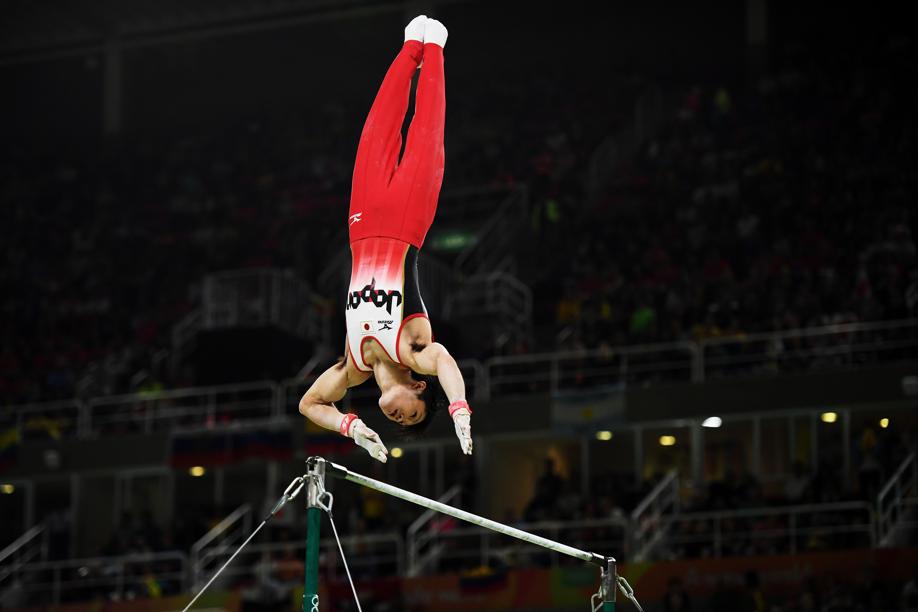
RIO DE JANEIRO — King Kohei’s crown was off-kilter and his throne was wobbling. Kohei Uchimura was down by nearly a point to Ukraine’s Oleg Verniaiev with one rotation left in the men’s all-around on Wednesday evening and a coup seemed imminent.
“Since 2009 I have maintained this title but this time was really the trickiest for me,’’ said Japan’s rock star with chalked hands, who’d won the gold medal in London and three world titles both before and since. “I felt close to admitting that it might be really difficult.’’
It was high drama on the high bar, a five-ringed showdown at 9 feet, where one slipped hand would make the difference. Thus did the glamour event in Olympic men’s gymnastics come down to the top two contenders with the rest of the competition completed. And when the numbers went up, royalty had prevailed by 99 1,000ths of a point (92.365-92.266) and the Japanese, who’d unhorsed the Chinese for the team title on Monday, had won the only other one that matters to them.
“This is a great victory for me — six world championships and two Olympic Games,’’ the 27-year-old Uchimura proclaimed after he’d become the first male gymnast since countryman Sawao Kato in 1972 to win consecutive Olympic all-arounds and the first since Kato in 1976 to collect medals in the event at three straight Games. “I proudly say I raised the bar of individual events.’’
Not that the decision was unquestioned. Coincidentally or not, Uchimura just happened to make up everything that he needed to plus a golden sliver. Did reputation count? Quite possibly. Uchimura had won three times as many consecutive world titles as anyone else ever had. He was the reigning global champion on high bar. Verniaiev had been 11th in 2012 and missed the podium at last year’s global meet in Glasgow. Was anybody outside of Donetsk going to holler that the fix was in at Olympus?
“Absolutely no,’’ Uchimura declared. “It will never happen. All the athletes are on par in the eyes of judges. There is no such thing as judges liking a certain athlete or not.’’
He may not be a global icon like swimmer Michael Phelps or sprinter Usain Bolt. “Everybody knows their names but Kohei Uchimura — who is this man?’’ he acknowledged. “I don’t think I am well known in the world.’’
But everyone who can tell the horse from the rings knows who King Kohei is. “He’s a legend and it’s very exciting to watch him,’’ said Simone Biles, the three-time world titlist who’s favored to win the women’s crown on Thursday. “It’s awesome seeing him around the village because he’s just so chill. Every time he’s in the cafeteria he’s like, ‘Yeah, like whatever, you know.’ He just carries himself very well and we all look up to him because he’s a normal human being like the rest of us, but he’s done so much.’’
Uchimura’s third turn around Olympus hadn’t begun well. He ran up a $5,000 cellphone bill shortly after he arrived by playing Pokemon Go, not realizing how steep the roaming charges were. “He looked dead at the team meal that day,’’ said teammate Kenzo Shirai. His service provider back home let him off the hook by signing him up retroactively to an unlimited daily contract but nobody could stop Uchimura from falling off the high bar in team qualifying.
His teammates rebounded in the final to unhorse the Chinese and give Uchimura the one medal that he really craved. “Winning the individual gold would make me happy,’’ he said, “but the team gold means you get five times the happiness.’’
The all-around didn’t figure to be as much of a challenge but from the start, when he fell behind Max Whitlock, whose bronze was Great Britain’s first medal in the event since 1908, Uchimura was scrambling. Though he briefly had the lead after pommel horse, the champ had slipped to third midway along.
When Verniaiev posted a lofty 16.100 on parallel bars to go up by 9/10ths of a point after five rotations, Uchimura feared that the math for once wouldn’t go his way. “Oleg achieved an incredible score, so I knew that of course,’’ he said. “I heard the announcement so I knew what I had to achieve as a target point.’’
Nobody here could match Uchimura’s skywalking abilities or his daring release moves. His 15.800 on high bar was by far the highest score of the day on the apparatus. What Verniaiev needed was a 14.899. What he got for his conservative set was 14.800. “I feel that I managed to make Kohei very nervous,’’ said the runner-up, who shrugged when he saw the score. “But he still retained his title.’’
It was, said US rival Chris Brooks, “a crazy tight score’’ but it was enough to put Uchimura up with the sport’s immortals and possibly enough to persuade him to continue on to 2020, when the gym will be in Tokyo and where he might just see his younger Ukrainian pursuer again.
“I respect him a lot,’’ Verniaiev said. “Next time we will see who’s the strongest. At the world championships I told people I would be back to win in Rio. Now I say I’ll win next time.’’



